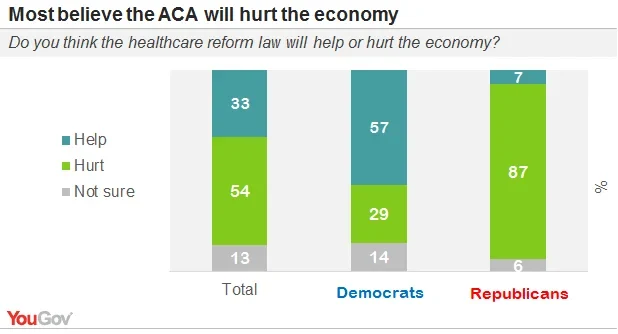Political polarization does impact views about the economy, but it doesn't tell the whole story
Despite evidence that the economy is slowly getting better, many Americans have yet to recognize, or acknowledge, any improvement. More than a third – 38% – in the latest Economist/YouGov Poll are convinced that the jobless rate is higher now than it was the first month of Barack Obama’s presidency.
The easy answer, of course, is politics. Republicans – whose approval rating for Barack Obama is usually somewhere in single digits (7% this week) are unlikely to credit him with any improvement during his tenure. And this is clearly visible in their negative assessment of the state of the economy. For example, in this week’s Economist/YouGov Poll, 57% of Republicans view the overall economy as getting worse, and just 5% say it’s improving.
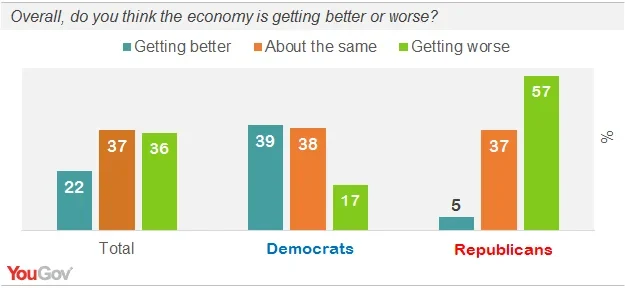
But it isn’t just Republicans who are down on the economy: fewer than four in ten Democrats are positive.
Many Americans don’t see any real improvement, despite the fact that the unemployment rate is lower today than it has been at any time in Barack Obama’s Presidency. For the last year, the jobless rate has been lower than it was in January 2009, as Barack Obama was inaugurated. But only four in ten say it is lower; with nearly as many believing the rate is actually higher today.
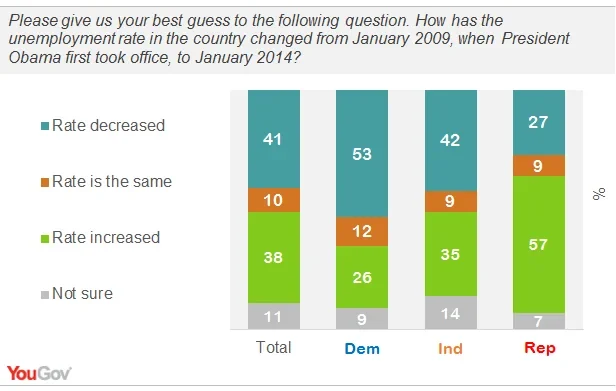
Clearly, much of that is politics: more than half of Republicans say the unemployment rate is higher now, while most Democrats see a drop. But to place all the blame on politics – or to say that Republicans aren’t paying attention to data – would be to ignore other reasons Americans have become negative.
The political argument – with people viewing the economy through a partisan lens – is important and worth making. Polarization in the country has increased dramatically in the last few decades, through the Clinton Administration and the impeachment debate and the Administrations of George W. Bush and Barack Obama. For example, in February 2007, a CBS News/New York Times Poll found George W. Bush with a 65% approval rating from Republicans and only a 6% rating from Democrats – a gap of 59 points. In this week’s Economist/YouGov Poll, 75% of Democrats approve of how Barack Obama is handling his job, while just 8% of Republicans do – an even larger 67 point gap.
However, economic data can be hard to grasp – and is sometimes easier to understand when the news is bad. In the 1980’s, during the Presidency of Ronald Reagan, the inflation rate dropped while the unemployment rate rose. Americans in CBS News/New York Times Polls were able accurately to say that joblessness was increasing, but weren’t sure the inflation rate was dropping. In October, 1982, when the jobless rate was just over 10%, 92% of registered voters thought unemployment had grown in the last year. But just 36% knew that inflation was dropping, as it had been for more than a year.
In this week’s poll, the better educated and the better off are most likely to see the unemployment improvement. Most college graduates (54%) and most of those whole family incomes are above $100.000 a year (57%) said unemployment was dropping. In fact, the unemployment rate for college graduates has been significantly lower than the jobless rate overall. Though it rose above 5% in 2010, it has come back down to about 3% today.
Years of bad economic news take a toll on perceptions. Some of the worst ratings on the state of the economy during the Obama years occurred in the summer of 2011, when more than half the public thought the economy was getting worse. Though the unemployment rate had been coming down for nearly a year at that time, it was still over 9%. Even though today’s figures are better, more than a third still think the economy is getting worse. Only 22% think it is improving.
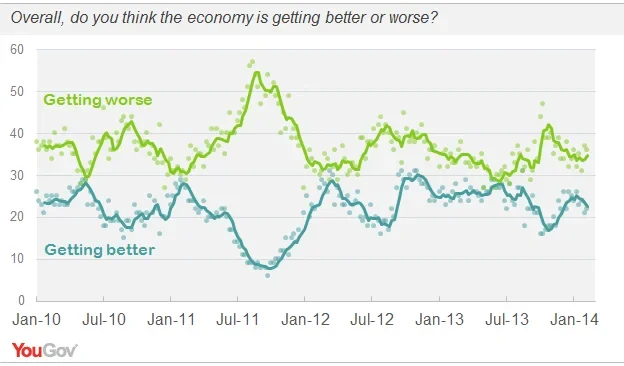
Thinking the economy is getting worse became a habit during the Great Recession. Only three times in Economist/YouGov Polls conducted in the Obama Administration was the percentage thinking the economy was improving as high as the percentage saying it was getting worse. Those times occurred last spring and summer, but the pattern quickly reverted to the current pessimism.
Another way people look at the economy – one that may be less subject to politics – is how the economy affects them personally. Despite the drop in the unemployment rate, many people feel financially squeezed. And today when it comes to personal economics, the public is more than twice as likely to believe their family’s finances have gotten worse in the last year as to say they have improved.
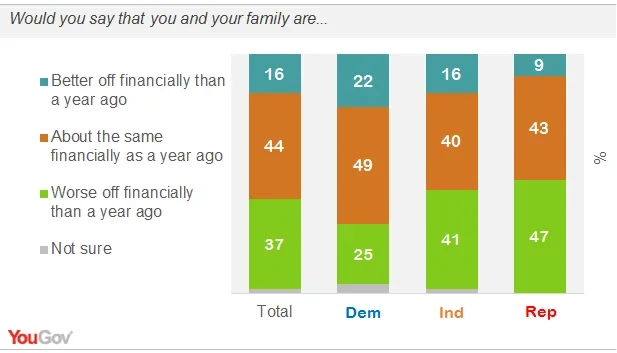
While nearly half of Republicans say things have gotten worse for their family, Democrats also are more negative than positive about the state of their family’s finances.
There is uncertainty about the future, and pessimism is dominant. More say unemployment will be higher in a year than think it will be lower; five years from now things are likely to be even – as many say unemployment will be up as say it will be down.
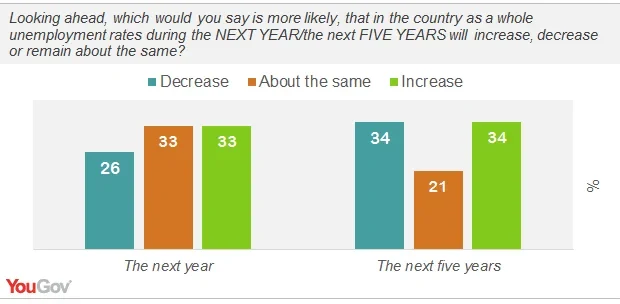
Finally, there are the low evaluations of the health care law, and low expectations for what happens next. 43% in this week’s poll want to repeal the Affordable Care Act. Assessments of the website have improved (this week positive evaluations are at their highest point yet: 36% of visitors report a positive experience at healthcare.gov, though more, 46%, have a negative assessment), but Americans fear what Obamacare could do to the economy. They may not know, but they worry: a majority believes the health care law will hurt an economy many think is still in trouble.
